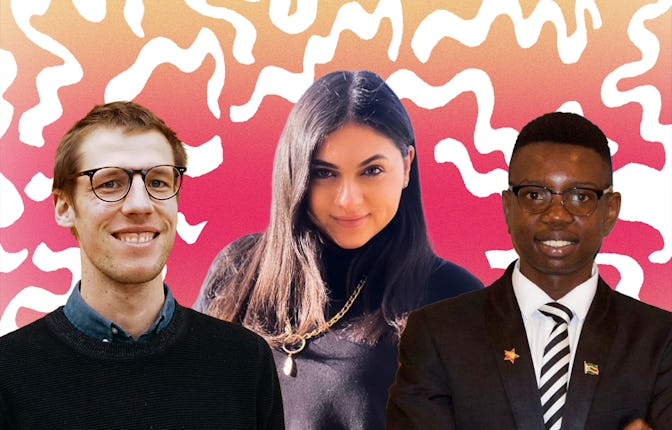The U.N. wants to save the planet by 2030. These 3 young leaders are working on it.
Inspired by personal experiences, they’re harnessing technology to tackle the world’s most pressing problems.

It’s been nearly seven years since the United Nations General Assembly adopted the Global Goals, a set of 17 priorities that forms a “blueprint to achieve a better and more sustainable future for all” by 2030. They run the gamut from protecting the environment, to eliminating poverty and hunger, to increasing economic opportunity.
It’s a serious undertaking — after all, we are very much living through a climate emergency — which is why Samsung and the United Nations Development Program teamed up to launch Generation17, an initiative devoted to accomplishing these goals. Named for the 17 priorities, the program provides support to a group of young leaders from around the world who have dedicated themselves to making change happen in pursuit of the Global Goals. Here are three of their stories.
Nadine Khaouli, Lebanon
Goals: No Poverty, Zero Hunger, Good Health and Well-Being, Reduced Inequalities
The day after an explosion killed 178 people and displaced hundreds of thousands in Beirut City in August 2020, Nadine Khaouli co-founded Kafe be Kafak (Hand in Hand). The organization has since grown into a network of more than 100 young volunteers working on the ground across Lebanon to provide food, compensation, and other necessary aid to displaced families.
“We’ve been able to support more than 15,000 individuals from all over Lebanon,” Khaouli says, “and we’re giving the power to youths … to lead on the campaigns in their areas.” Her own village doesn’t have electricity for most of the day, but battery-powered electronics coupled with cellular service allow Khaouli to raise funds from around the world and coordinate the distribution of those funds to people in need throughout Lebanon.
Tafara Makaza, Zimbabwe
Goals: No Poverty, Decent Work and Economic Growth, Sustainable Cities and Communities
The opportunity to travel opened Tafara Makaza’s eyes to the lack of opportunity in his home country of Zimbabwe, as well as the African continent as a whole. While visiting the United States after high school, he realized technology is key to making change. Makaza subsequently launched a platform connecting people in the informal economy with sustainable job opportunities.
What sets Makaza’s work apart is his emphasis on long-term career development in addition to short-term opportunities to make money. These jobs not only provide steady income, but they also help workers build career identities and financial records that can help them secure credit in the future.
“What does LinkedIn look like for the linked out, people who don’t have a formal education?” he asks, outlining the questions that drive his work. “How do you keep a record of what’s going on without technology?” By creating these kinds of professional records, he’s helping people lift themselves out of poverty and stay there.
Kristian Kampmann, Denmark
Goals: Decent Work and Economic Growth; Industry, Innovation, and Infrastructure; Sustainable Cities and Communities
Growing up in Denmark, Kristian Kampmann internalized from an early age the idea that everyone everywhere deserves opportunities for social mobility. “My ambition with UNLEASH,” the nonprofit organization he now heads, “was to create a platform for youth-led innovation to tackle the [Global Goals], but particularly focus on bringing together young people from underserved communities,” he says.
Kampmann works to ensure that young changemakers around the world have the resources they need — from idea incubation to fully-funded scholarships — in order to implement the solutions they’ve dreamed up. He focuses on young people specifically because he says they’re uniquely attuned to the scale of problems like climate change, and better suited to think big and take risks in tackling those problems.
Technology has allowed Kampmann and UNLEASH to scale up their work, from what started as purely in-person programming to a vast network that includes virtual programs accessible anywhere with Internet access — mobilizing far more young people than would have been otherwise possible.